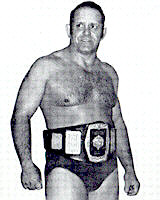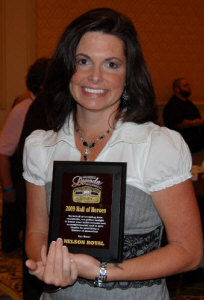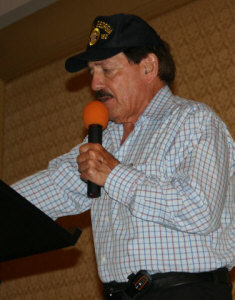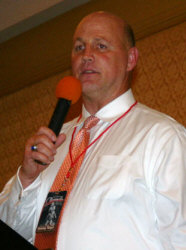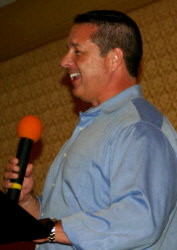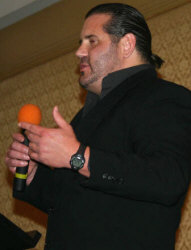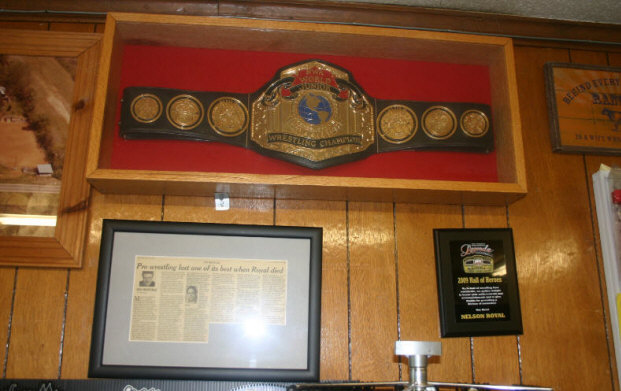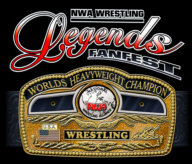 |
|
|||
|
Nelson Royal Class of 2009
RETURN TO THE HALL OF HEROES HOME PAGE NWA WRESTLING LEGENDS FANFEST WEEKEND UPDATED! HALL OF HEROES PLAQUE AND CHAMPIONSHIP BELT ON DISPLAY AT NELSON ROYAL'S WESTERN WEAR SHOP
|
||||
|
|
Member of the Hall of Heroes Class of 2009 NELSON ROYAL |
|||
|
Accepting for their late father: David Combs Royal and Shannon Royal McCrary David Combs Royal photograph by Mark Robertson • Shannon Royal McCrary photo by Irwin Markowitz
Shannon Royal McCrary, Hall of Heroes host Jim Cornette, Paul Jones, and David Combs Royal Photograph by Dick Bourne
Honoring Nelson Royal at the Hall of Heroes:
"No. 1" Paul Jones
Tommy Angel, David Isley, and Brad Anderson Photographs by Dick Bourne
Given his down-home nature and the fact that he sold western-style goods to a generation of Carolinians, it’s pretty hard to imagine Nelson Royal as a pompous, overbearing Englishman in tails and top hat. But that’s what he was, as the lordly Sir Nelson Royal of Lancashire, slipping foreign objects into his kneepad to gain an upper hand as his valet Jeeves looked on. In the early 1960s, Royal worked the Amarillo, Texas, territory as an uppity bad guy with Bob “The Viking” Morse as his partner. But not long after they ventured east in 1965, the pair split up and Royal became the good-natured technician who’d delight Mid-Atlantic fans for the next quarter-century. Royal was born Nelson Combs July 21, 1935 in Floyd County, Ky., and got into wrestling when the legendary Don Eagle spotted him at an amateur match in Columbus, Ohio. “He made an arrangement with my dad to take him under his wing, and my dad actually traveled with Don Eagle for 14 months, and Don showed him the ropes,” his son David Royal said. Royal broke in with Al Haft’s prestigious Columbus promotion, and quickly hit the road to Idaho, New Mexico, Washington state, Oregon, Maryland, and the Carolinas in 1956 and 1957. In the Mid-Atlantic, Royal, who went about 5-9 and 220 pounds, became a tag team specialist, first pairing with Tex McKenzie in 1966 in a big man-small man duo, then adding a young Paul Jones to his side in 1968. The successful combo traveled to Los Angeles to capture the International Tag Team title. Jones said he tapped into Royal’s popularity to help establish himself as a main eventer in the Carolinas. “We were partners for about four years. Never had one argument. Sweetheart of a guy.” Royal found the area to his liking, and put an end to most of his travels, though he occasionally slipped off overseas. I’d rather be here with my family. My wife, Karen, has never really been able to accept the travel, and I hate it every time I have to leave home,” he said in 1987. After Jones, Royal had partnerships with wrestlers like Les Thatcher and Sandy Scott before holding the world junior heavyweight belt three times in the 1970s. Royal didn’t pull his punches, either. He came from a background that emphasized tough, realistic mat action, and his body paid the price. “I’ve got more stitches in my head than I want to think about,” he once joked. “God, I loved to wrestle with him,” said Rip Hawk, who took his youth wrestling team to see Royal in Charlotte during a Junior Olympics event. “He told the kids, ‘You think he’s such a great guy, that old SOB broke my leg.’ It’s true. We were doing a little wrestling deal and I just snatched him a little too much. I felt terrible but there were no hard feelings. He was not only a friend of mine but a good wrestler.” Royal also loved his horses and his ranch. “He was always riding when he was home,” David said. “He had two or three stallions at different times, and showed on the circuits and so forth when he had an opportunity.”
Royal became a trainer with former foe
Gene Anderson and ran the Atlantic Coast Wrestling promotion after
Jim Crockett Promotions folded. “You couldn’t find a better guy,”
Ronnie Garvin reflected after Royal died of a heart attack in 2002.
He lives on to the many wrestlers he trained, and his western gear
store is still in operation in Mooresville, N.C. The Hall of Heroes
banquet will be a fitting time to remember what “Nellie” meant to
wrestling. - Steve Johnson
Co-Author, The Pro Wrestling Hall of Fame: The Tag Teams
With Great Honor (Originally posted on MinnesotaWreckingCrew.com / MidAtlanticGateway.com)
The legendary Nelson Royal is being honored this year at the Hall of Heroes Dinner Banquet and Awards Ceremony in Charlotte on August 7. The Hall of Heroes is an annual part of the NWA Wrestling Legends Fanfest, held this year at the University Place Hilton August 6-9 in Charlotte. Royal will be honored posthumously by his long time friend and former tag team partner Paul Jones, as well as three of Royal's wrestling students when Royal trained young men who were hoping to break into the business in the 1980s and early 1990s. Those three students are Tommy Angel, David Isley, and Brad Anderson. Brad is the son of Gene Anderson, part of wrestling's legendary Minnesota Wrecking Crew. Gene and Nelson worked together on the wrestling school for Jim Crockett Promotions. Naturally, Brad had ample opportunity to be exposed to professional wrestling at an early age, both from his father but also from his mentor, Nelson Royal. Brad was present to accept for his father when his Dad was welcomed posthumously in the Hall of Heroes Class of 2007. In advance of his participation with the group of peers that will honor Nelson at this year's Hall of Heroes banquet, I had the opportunity to talk with Brad regarding his thoughts and memories of that time in his life, riding the roads with his father and training under the great Nelson Royal.
Q. Do you remember how old you were when you first met Nelson Royal? Did your families socialize at all, were you around him growing up? A. I only remember hearing the name as a kid. I don't remember meeting him until Dad and Nelson started the wrestling school. So I don't have a deep history as a younger kid like I did with some of the other wrestlers until about the age of 15. I got more than my share of him though over the years following that.
Q. Tell me a little about the training that Nelson did for Jim Crockett Promotions. Who else was involved and where did it take place? A. I know the school started because the office wanted to train a couple of guys and asked Dad and Nelson to do it. There was a black guy that went as "The Night Train" and the other was Todd Champion. I am not real clear on the early beginnings because I was a teenager and was interested in my own thing. I do know that if it wasn't the first place, it was right in the beginning that Nellie and Dad used an old machine shop-aluminum building on Nelson's land in Mooresville NC to train the guys in before there was a school. No A/C or heat, just open the garage door for circulation. They used a ring that the office had given them. It was an old sturdy rock hard stiff ring. Stiff as hell!
Q. You obviously were around wrestlers all the time growing up, and probably hung around Nelson’s camp a lot before you actually began serious training to wrestle. How did you become one of Nelson's students? A. I had been hanging around the school once it began mostly to try and be cool by associating myself with 'wrestlers' about the age of 15. I never got 'smartened up' for another couple of years. I did have to go up though and 'shoot' and 'stretch' the guys who were trying out way before I was 'smart'. I started getting serious at 17 and I remember one day dad and I were riding up to Mooresville and out of nowhere he said "Nelson is going to train you. We decided he would be better for you." I never asked who is "we decided" or why it would be better, I was just happy as hell to start training full time.
Q. What was the process like with Nelson? A. I don't believe I was treated any differently from the other guys, and that is a testament to Nelson's love and respect for the business. Nobody got a pass or had it any easier regardless of who they were. I did not have to go through a tryout though, and those were absolutely brutal. I guess my Dad didn't make me go through a tryout because he used to throw me to the wolves starting at around the age of 10 when I would have to go meet some of the wrestlers who were good shooters and they would stretch me and teach me how to shoot. For example, guys like Mike Rotundo, Iron Sheik, and Don Kernodle. Nelson was more hands on in the ring with us. Dad would usually be on the outside and tell us "looks like shit, do it again." We bumped our asses off, learned wrestling holds, learned to listen in the ring to who was calling the match. The whole time the 'psychology' of how to put a match together, how to get heat, and how to sell was introduced and reiterated over and over. The psychology is something I can't begin to describe. It was an ongoing process of how to get over and make what you do mean something. Nelson and Dad would say "Listen to the people, you have to know how to make them get up out of their seats, make them sit back down, and then make them get back up again." Watch the crowd of today's wrestling. You never know how they will respond and I don't think the crowd knows what to do most of the time either. Go back 30 years and the great wrestlers of that era were like conductors, and the crowd was the orchestra.
Q. Did you get to assist Nelson and your father in training sessions as time went by? A. No one really taught anything if Dad or Nelson weren't overseeing and instructing us. Again, I did have to stretch guys who were trying out. I never liked doing that. They were always so past exhausted by the time I got in there with them, they were grown men who wobbled like Jello from fatigue, and I would get chewed out if I didn't hook and stretch them. Dad and Nelson wanted to send a message to guys who thought they could be a wrestler.
Q. Who were some of the guys that came through Nelson’s camp when you were breaking in that went on to work in the business? A. Tommy Angel, Ricky Nelson, David Isley, Curtis Thompson, Trent Knight, Joe Cruz, Rusty Riddle, Colt Steele, Cougar J, L.A. Stephens, Bob Blackburn, Mike Force, Johnny Ace (Laurinitis), Mark Laurinitis
Q. Any stories you’d like to share? A. My favorite is the one when Tommy Angel and I worked a tag match in the school with Nellie and Johnny Weaver. About 30 seconds into it I had no idea what I was doing. I tried to keep up by just listening but I was not even on the same planet with those two. This was inside the school but Johnny and Nellie were going at it like it was Monday night sold-out in the Park Center. It is with the utmost honor, not pride, that I can say that happened to me in my lifetime.
Q. What does it mean to you to be one of a group to honor Nelson at the Hall of Heroes banquet? A. Undeserving, humbling, I can never put to words what Nelson taught me about wrestling. I was willing to do the Hall of Heroes so that I could express my gratitude because Nelson is so much bigger than anything I could explain.
Nelson's Hall of Heroes plaque hangs on the wall of Nelson Royal's Work & Western Wear shop in Mooresville NC. The wall also features one of Nelson's world junior heavyweight title belts, as well as a framed newspaper article by Mike Mooneyham of the Charleston Post & Courier. The shop is located at 193 E. Plaza Drive, Mooresville, North Carolina.
|
||||
© 2005-2009 NWALegends.com, All Rights Reserved. Page Designed and Edited by Dick Bourne © 2007-9 Mid-Atlantic Gateway
|
||||

